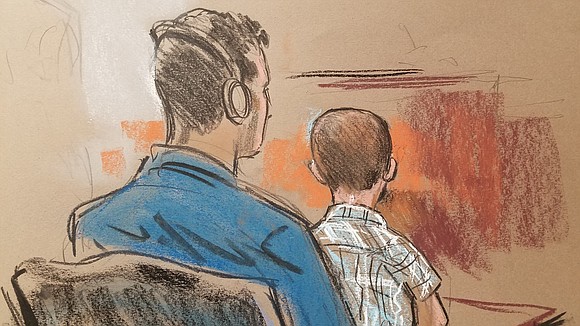Kids in Immigration Court: A Maze with Life and Death Consequences
CNN/Stylemagazine.com Newswire | 7/6/2018, 11:10 a.m.
By Tal Kopan, CNN/StyleMagazine.com
(CNN) -- "Your honor, meet the respondent," immigration attorney Lenni Benson said as she introduced the crying toddler in her arms to the judge that would be hearing the child's case.
Benson remembers the incident well. The child was at court with her grandmother, and Benson tried to comfort the crying girl to help the court.
"The judge was so frazzled by the crying and said, 'Can someone please take this kid out of my court?'" at which point Benson informed the judge that the child was actually one of her cases.
"She couldn't believe it," Benson recounted.
All across America, migrant children appear before immigration judges to fight for permission stay in the country. Historically, closer to one in three had lawyers, according to data maintained by a clearinghouse at Syracuse University. But recently released Justice Department data says the first two quarters of this fiscal year, 79% of kids with cases at least a year old were represented.
It's a byzantine process to navigate, even for experienced attorneys like the ones Benson works with at the Safe Passage Project in New York, which she founded to help kids in immigration proceedings. And it's a system that has existed for decades, across administrations and Congresses that have sputtered rather than improve the system.
Benson described it as a complicated version of the board game "Life" -- but one that has life or death consequences for some of the children playing it.
The issue is gaining new attention as the Trump administration has separated thousands of children from their parents at the border as part of its "zero-tolerance" border policy -- thus ensuring those childrens' immigration cases are separated from their parents', as well.
Most of the children in the system are closer to their teens, but there is no minimum age. Toddlers and infants do, in fact, appear before judges in the system to defend themselves against deportation.
"Yeah, I get that reaction a lot," said Wendy Young, president of Kids in Need of Defense, when asked how she would respond to someone incredulous at the idea of a toddler representing themselves in court. "And with good reason, because it does shock the conscience."
Defenders of the system say the immigration judges are able to help kids navigate the process, and the federal courts have upheld those procedures thus far.
Jack Weil, an assistant chief immigration judge with the Justice Department in charge of immigration judge training, famously testified in a court deposition that someone properly trained could make any child understand what was happening.
"I've taught immigration law literally to three-year-olds and four-year-olds," Weil testified in 2015. "It takes a lot of time. It takes a lot of patience. They get it. It's not the most efficient, but it can be done."
He later told The Washington Post his words were "taken out of context," but did not explain how.
In the case of the crying toddler, Benson said, the girl's mother was told by smugglers they'd both have a better chance of staying in the US if they split up, with the little girl crossing the border with another unrelated woman and her grandmother's contact info. When they were apprehended by Border Patrol, the girl was separated from the woman and put into the children's care system run by Health and Human Services. She was eventually released to her grandmother, and the girl's mother decided that's where she'd remain the safest, leaving her and her grandmother to navigate the court process themselves.




